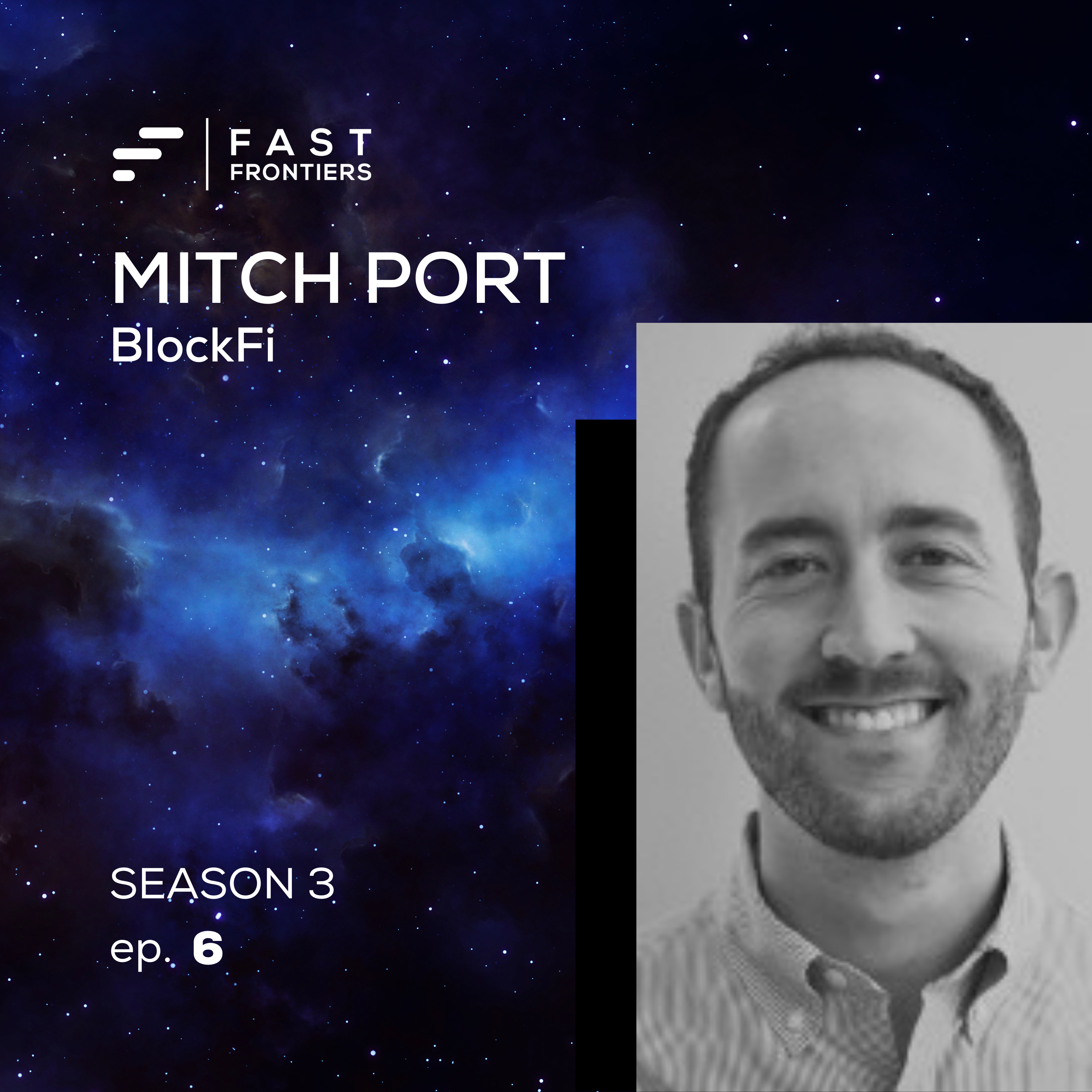S3 Ep 6. Mitch Port: BlockFi
- 0.5
- 1
- 1.25
- 1.5
- 1.75
- 2
Tim Schigel: Welcome to Fast Frontiers. I am your host, Tim Schigel, managing partner of Refinery Ventures. In this episode, we're talking with Mitch Port, Vice President of Strategy and Analytics at BlockFi, which provides wealth management products for crypto investors, all powered by blockchain technology. In this episode, we're going to dive into all things cryptocurrency, and how exchanges are actually very similar to traditional financial services. We're also going to discuss how crypto is plugging into open monetary networks, which allows access to clients worldwide. The biggest theme, or so what, I hope you can take away from this conversation is that crypto is still in the very early stages, likely the first or second inning, according to Mitch. While it still seems like everyone is talking about it, adoption and engagement is only around 1%. It'll be exciting to see how the next few innings evolve. Please enjoy my conversation with Mitch Port. Welcome, Mitch.
Mitch Port: Hi, thanks, thanks for having me.
Tim Schigel: So excited to have this discussion today with Mitch Port, who's Vice President of Strategy and Analytics at BlockFi. And so this is, for anybody interested and curious about crypto and what's going on, not only basic explanation but also the latest, because I think BlockFi is on the leading edge, pioneering the future of cryptocurrency. So Mitch, first of all, some people get the crypto bug, others haven't got it yet, but give us a little bit more about your background, your origins, and why you were susceptible to it.
Mitch Port: Yeah, yeah, absolutely. Again, thanks for having me, Tim. I guess the majority of my career up until about three years ago was in strategy consulting. Most recently I was working at Bain and Company out of our Chicago office, and Bain is a pretty generalist consulting firm, so working across private equity, industrials, consumer goods, with really the focus being strategy and helping our clients make better data driven decisions. Prior to that I got my MBA at Northwestern, but traditional background in consulting and things like that. But I actually caught the bitcoin bug back in 2011. Unfortunately, it didn't bite hard enough, or else things might have turned out a bit differently for my career. But it's really fascinating to me, I guess. I was drawn to it. Politically I'd been really interested in Austrian economics, and the idea of non state money. And trying to understand if something outside of fiat currency could eventually take hold was really interesting to me. As I progressed in my career, the space had really matured quite a lot. In 2011 there was basically nothing, maybe one or two companies, a handful of people. But when I decided to make the jump in mid 2018, there was much more robust industry. So I looked around, ended up taking a job at Kraken Exchange, which is a large global exchange based out of San Francisco. Director of strategy there for a little over a year and a half doing similar work to what I would have done at Bain for our clients, but helping with both short and long term strategy, working on some MNA, both diligence and post acquisition integration, and things like that. And then for the past about year, I've been at BlockFi, and I'm currently vice president of strategy and analytics there. So similar mandate, and how do I grow the company's various business lines, taking a really data driven approach to that.
Tim Schigel: What was it with Kraken, when you were there, can you share, what did you learn in terms of the difference between a theory of what you read and studied and thought on crypto and actual implementation, real life learnings in that experience?
Mitch Port: I guess I was a bit surprised, despite having spent a lot of my free time learning about crypto, once you get in the actual industry, it's very similar to traditional financial services. At the end of the day, Kraken was an exchange, and exchanges are pretty proven business model in traditional finance. I didn't have a financial services background, so I was really having to learn a lot about that, and actually the crypto knowledge was certainly helpful, but frankly what's more helpful is just a really good understanding of traditional financial services. So I guess that was a bit surprising to me.
Tim Schigel: What has changed since you started that you've seen from the environment overall from a regulatory standpoint?
Mitch Port: I think, particularly the US, the regulatory environment has gotten much better. I think in the early days there was a lot of questions about who has oversight on crypto, which of these crypto assets can be traded and which ones can be deemed as securities. There's still frankly a lot of work to be done. It's very patchwork, particularly in the US, like you kind of have to go state by state to understand what you're able to do from a trading, from a lending, and other perspective. But we have gotten some pretty decent guidance. Bitcoin has been deemed not a security, the OCC has said banks are able to custody digital assets, the IRS is providing guidance on how things are taxed. I think there's just been a lot more regulatory clarity, which has created a comfort for more traditional players to start entering the space.
Tim Schigel: Yeah, so there's still quite a lot of work to be done, as you mentioned. How many innings are we into, how many years do you think in terms of the mainstream adoption? Obviously it's getting more and more popular. Every time there's an announcement, Elon and Tesla buying $1 billion or what have you, it creates more awareness, more people get in. Where do you think we stand in this progression?
Mitch Port: Yeah, well I might be biased here. I'm a pretty big bitcoin inaudible, but I think we're probably in the first or second inning. And the way I think about this is just looking at overall adoption, and there's various ways you can think about adoption, whether it's an S curve or something like that. But people have tried to pinpoint how many people worldwide own bitcoin, and I've seen some estimates of maybe 100, 110 million people, which on a percentage basis is low single digits. Even that in my opinion is a bit aggressive. I think the Coinbase S1, which recently filed before they went public, was very enlightening. The studies I talked about took their headline number at face value, 43 million customers. But when you dig in deeper, I think they've said they had about 2.8 million active users. That 43 million are just people that have signed up, given their email. There's a much smaller base of people that are actually engaged, and I think even those, a lot of them probably only have a very, very small, less than 1% allocation into the space. Given all that, I think we're probably less than 1% adoption, maybe half a percent, which to me means first or second inning.
Tim Schigel: Yeah, that's... Thanks for sharing that data, that's a great data point. While I see and hear some of the adoption, and I have a little bit of involvement, there's still so many people, and I'm sure this is, for the listeners, family members I talked to and others, even people that are in finance or have been in finance that are still on the sidelines asking the questions and trying to understand what it is.
Mitch Port: Yeah.
Tim Schigel: I'm sure there's going to need to be a lot more education. What was it that attracted you to BlockFi?
Mitch Port: I think BlockFi is a super exciting company, and maybe I can give a little bit about our business. For me, it was really the leadership team as well as the products and services that they were offering, which I think are really unique in the space. BlockFi is basically a crypto financial services company, and our mission is bridging the gap between crypto and traditional financial wealth management products. Currently our platform manages more than 15 billion in assets, and that number has grown substantially over the time I joined, and we have a number of products for both retail and institutional investors. I think we're one of the few companies that really does a great job of pairing the retail and institutional sides together. On the retail side we have four key products, the first being a BlockFi interest account, and that's a crypto bearing interest account. You can earn up to 8.6% APY, so you deposit money with us, and you earn in interest, so you're able to compound your investment. The next one is a crypto backed loans product. This is for people that want to borrow either USD or stable coin, which is effectively USD equivalent crypto. And they can use their bitcoin, Ethereum, Lightcoin, as collateral to be able to take out that loan. We have two more. One is trading, which is not super unique to BlockFi, but you're able to buy, sell, or swap crypto. And then lastly is our bitcoin rewards credit card, which we're going to be launching in Q2. This is a really exciting product. It's going to be a first to the market credit card in the space. And it's going to allow you to earn 1.5% back in bitcoin on all purchases made with the card in addition to some other benefits. That's the retail side of the business. And then the institutional side of the business is really, I view it as the back end, which really powers the retail products. We have BlockFi Institutional Services, which provides customizable lending and borrowing of crypto, stable coins, USD. And that's really powered by our crypto balances. So people lend us their bitcoin, retail individuals, and then we take that and we lend it out to institutions to be able to generate yield to pay back retail. To me, it was a really incredible business model, I think something that's really needed in the space. And if you look at the traditional markets, credit and debt are really big, and we hadn't really seen that yet in crypto. To me it's the next phase of the industry, where okay, great, now I have my crypto, what can I do with that? What additional products and services can I use to really leverage my crypto?
Tim Schigel: So now that you have these retail finance products that are similar to what somebody might engage say with traditional banks, how's the future going to be different 10, 15 years from now? Describe what you see as how the face of banking is different and why... The impact that crypto has had on that.
Mitch Port: Yeah. I think it's going to be very different. I think we're probably going to see a world where a lot of these crypto native companies get really large and we've seen that already with Coinbase, and I think once they've solidified their crypto product suite, they'll probably start extending into equity and other things like that. And I think we'll also see the reverse, and we already have been seeing that, where traditional financial institutions are realizing they need to have a product suite in the crypto space. I think what crypto really allows, which is pretty amazing, is crypto is really worldwide. We're plugging into these open monetary networks basically, which allows us from day one to be able to access clients worldwide. BlockFi, I'm not sure what the latest count is, but last I checked we had clients in over 160 different countries around the world. And that's just because we can use the crypto rails to be able to access these customers. We don't have to necessarily interact with traditional banks or anything like that. As long as somebody has crypto, they can send it to BlockFi, we can fund loans and stable coins all around the world. And that really gives us a great competitive advantage, where we can start from day one being a global company. I think it's 30 to 40% of our clients are currently international, despite the fact that we haven't done any marketing outside of the US, which just really shows how much of a demand there is internationally for these types of products. I think that is incredibly new to crypto, and something that is probably raising the eyebrows of a lot of people in traditional finance who are having to go country by country and really build it out, that international strategy, as opposed to being able to do it from day one.
Tim Schigel: How much of that is driven by currency hedging, if you will, versus the need for people to transfer money and to move money around?
Mitch Port: Yeah, that's a great question. It's tough to tell. I think worldwide there's obviously a huge demand for dollars. Dollars are still the reserve currency of the world. So BlockFi enables people to get exposure to dollars, either by buying stable coins or by taking out dollar based loans using their crypto. So that's certainly very attractive to people internationally that want dollar exposure. But beyond that I think people are also, depending on the country, they either, dollars or bitcoin or something like that might be more attractive than their local currency. So it's really on a case by case basis, and there's so many different reasons why people would want to get involved in the space, especially internationally.
Tim Schigel: When you joined, tell us a little bit about the journey just as a company, and what you're learning as it relates to being part of a fast growing company. BlockFi recently, you closed a, was it series D, $350 million round?
Mitch Port: Yep. Yeah, that's right.
Tim Schigel: Yeah, so tell me what that journey's been like.
Mitch Port: It's been great. That's another reason why I joined is being able to join a really fast moving startup. I think we're really hitting our stride. So when I joined, I think nine or 10 months ago, there's maybe 80 to 100 people at the company. We're already at I think about 550 people. So just really explosive growth, and our numbers in terms of our client base, our revenue, are even more explosive than that. It's been really great. I started as a team of one, I've now got a team of six working for me. It's just always great because there's so much you could be working on. You really have to wear a lot of different hats. For me it was finance, strategy, analytics, project management. So you really get to learn a lot of different areas of the business. We're just really scrappy, but still very much data driven. So being able to do an analysis, make a recommendation, and then put that into action that day or the next day is just really invigorating, and it makes it a really great place to work.
Tim Schigel: What are some of the challenges with that growth?
Mitch Port: Yeah, I mean I think the challenges are probably similar to other fast growing startups, where sometimes we're growing faster than our internal processes and procedures. So we're trying to meet the market demand, or we're trying to scale up our client services or something like that to address the really rapid growth. Oftentimes, we'll create some short term solutions to get things done. And then once we settle, we'll have to go back and figure out, okay, how do we make this more scalable? It's really tough to build something extremely scalable. I think you need to be really thoughtful and have a lot of lead time. Oftentimes at a fast moving startup there's not the luxury to do that, so we oftentimes go back and figure out, okay, this is working well, but how do we prepare for the next five, 10x, in terms of scalability?
Tim Schigel: The other thing it's making me think about is, for many entrepreneurs I talk to or people that want to become entrepreneurs or work at startups that'll come ask for career advice or what have you, it seems like they identify and think startups means seed stage at an accelerator somewhere.
Mitch Port: Right.
Tim Schigel: You're still a startup. But a startup with 500 some employees, and raise hundreds of millions of dollars. I think if you, for a lot of folks, unless you're going to be the founder, joining a company like BlockFi at the point you did, or even Kraken, gives you great experience. You're experiencing that growth. The period you've been there, you're not one of the senior, yet you're an old timer.
Mitch Port: Right. Which is crazy, not having even been there a year, but I'm definitely an old timer, yeah.
Tim Schigel: Yeah. Yeah, and think about all the things you learned that you can then pass on or take with you the next time when you get involved in something even earlier.
Mitch Port: Right, yeah.
Tim Schigel: So what role does... I mean obviously this is all happening in the midst of COVID, what impact has that had, and to what degree is your workforce a remote workforce?
Mitch Port: I guess, COVID for our business, once this hit, and I joined right at the beginning of COVID. We as a company made the decision, we want to use this more as an opportunity for us. We are a technology company at the end of the day, our clients can interact with our platform online. So I think that's an advantage for us. And we, I think given everything that was going on, we decided instead of holding back a little bit, we were going to double down. So we actually, during a lot of the market tumult in March and April, we decided to actually double our marketing spend, because we thought this is a time where crypto and our offering is incredibly attractive, and it turns out in retrospect that was a really great move. Despite COVID, we've actually seen really explosive growth in terms of the business. I guess the challenge is obviously scaling internally, so we've added on hundreds of people, all remote, and previously BlockFi had been not a remote first company, so we have a hub in the New York City area. So going from that to purely remote certainly was a challenge, but I think we've been able to get through the practice pretty well, and I think that goes back to the transparency and openness of the company.
Tim Schigel: When you look back at what you've learned so far, if you were back talking to your freshly minted graduating college self, whatever age that was, 22 or so, what lessons have you learned that you wish you could go back and tell yourself?
Mitch Port: I think the number one lesson is probably buy more bitcoin.
Tim Schigel: Right.
Mitch Port: Beyond that, I think... I don't know if I would have done much differently. I think starting out, at least for me personally, being able to get the grounding in consulting was extremely helpful. I guess I would tell myself really focus at building a core skill set which is applicable no matter what industry you're in, and I think my time at consulting really helped me in problem solving, Bain particularly does a really great job helping you think through how do you really structure solving a problem, like how do you make a data driven recommendation, how do you do effective analysis, how do you effectively communicate recommendations to get from recommendation to action? I think building that core skill set is something I would still want to do. But where I am now, I probably would have liked to get more exposure to financial services, just knowing what I know now about how transferrable that skill set is. I guess the other thing is just, at the end of the day don't be afraid to make a move into the startup realm. I think it's super exciting and rewarding. You learn so much, and being able to wear a lot of different hats and really feel invested in a company is great, and I might have waited a few more years than I should have before diving in. I think my bias is being pretty risk averse, except when it comes to my own investments in bitcoin. But I think jumping into the space, especially nowadays, is not actually that risky, to be honest.
Tim Schigel: Conversations with your friends and family that are still learning or want to understand bitcoin and crypto, if they're asking you for next steps, what should they do to get involved, to take advantage of it given that we're just in the first or second inning. What is your best advice?
Mitch Port: Yeah, I think the number one thing is do your own research. Nowadays there's so much great material out there. I've been starting people with an interview that Michael Saylor, who's the CEO of MicroStrategy did with Ross Stevens, who's the CEO of New York, NYDIG, which is basically a crypto financial services firm. It's really a great overview of bitcoin and the value proposition there. But I think it's, one, just spend a little time going through some of the amazing work that's been put into the space. And then buy a little bitcoin, play around with it. I think it's one of those things where, again, you don't have to buy a full bitcoin. You can buy 10, 20 bucks' worth. Just go through that, experience it, send it around, and I think once you start playing around with it, you really grasp how interesting and powerful it is. That's really my advice. Do a bit of research, buy a little bit, and you'll start falling down the rabbit hole as we call it soon enough.
Tim Schigel: Yep. So start learning by doing.
Mitch Port: Exactly. Yeah.
Tim Schigel: Yeah. Good advice. And of course, the other thing that people need to do is sign up for the BlockFi credit card, which I have done. Maybe through an interview I can get put higher on the list, I don't know. Is that possible?
Mitch Port: Yeah. That is a great piece of advice. The rationale behind that card is exactly this, actually. We want it to start broaching into what we call the crypto curious market segments. Those are people that are not already really in depth, and we want a really easy on ramp for them into crypto. So instead of having to figure out how do I sign up for an exchange, or buy or sell, let me do something I'm familiar with, which is a credit card, instead of getting airline miles, or instead of getting my cash, which is being devalued by inflation, let me just get a little bit of bitcoin back. That is a really unique way to enter into the space, so that's one primary segment that we're targeting is people that are brand new to crypto but are interested enough to dabble in it. We have seen a trend over the past few years, more so instead of spending your crypto, which I think people nowadays don't want to do because they think the value is going to go up, the narrative has really flipped to how do I earn crypto? The BlockFi credit card is great, you can get bitcoin back. There's other companies like Lolli or Fold where you can earn bitcoin by doing your traditional shopping. And these are all really great products to get a little bit of exposure to bitcoin, and I think are really attractive for more of the mainstream audience.
Tim Schigel: That's a really smart idea. I think that's going to be very popular. I'm sure you got a lot of folks signing up for it. Well Mitch, thank you very much for sharing your knowledge and experience with our Fast Frontier listeners. This is clearly one of the fastest frontiers out there in cryptocurrency, we'll be excited to continue to watch your career, and what the third and fourth and fifth innings look like.
Mitch Port: Yeah, absolutely. Me too.
Tim Schigel: All right, thank you.
Mitch Port: All right, thank you.
Tim Schigel : Thanks for listening to Fast Frontiers. If you like our show and want to know more, check out our website, fastfrontiers.com. If you enjoyed this episode, please share it with others and give us a rating and review on your favorite podcast platform. Join us next week when we bring you my conversation with John Simon, managing director at Sigma Prime Ventures and board chair and co-founder of Greenlight Fund. The Fast Frontiers Podcast is brought to you by Refinery Ventures. Our producer is Abby Fittes. Audio engineering by Astronomic Audio. Marketing, content, and social media support from Constant Callout, and our podcast platform is Casted.
DESCRIPTION
In this episode, we're talking with Mitch Port, Vice President of Strategy and Analytics at BlockFi, which provides wealth management products for crypto investors, all powered by blockchain technology. We're going to dive into all things cryptocurrency, how exchanges are actually very similar to traditional financial services, and how crypto is plugging into open monetary networks worldwide. We also discuss that crypto is still in the very early stages, likely the first or second inning. While it still seems like everyone is talking about it, adoption and engagement is only around 1%. It'll be exciting to see how the next few innings evolve.
Today's Host

Tim Schigel
Today's Guests








